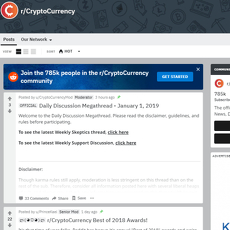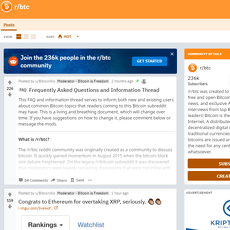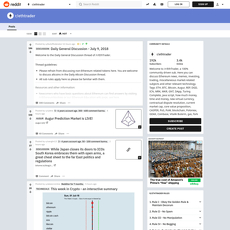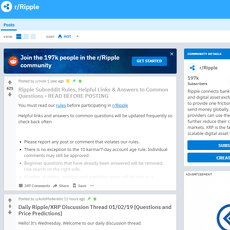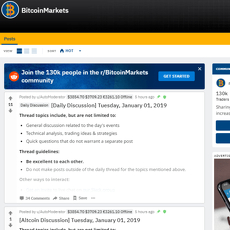r/BitcoinBeginners Review
r/BitcoinBeginners
www.reddit.com
r/BitcoinBeginners review guide: how to use the subreddit the smart way (+ real FAQs on fees, $100 buys, and cashing out)
Ever opened Reddit with a Bitcoin question and thought, “Where do I even start without getting roasted?” If that’s you, r/BitcoinBeginners is probably the friendliest on-ramp. In this guide, I’ll show you exactly how to use the sub, skip the noise, and get answers that actually help you buy, hold, and secure your first BTC.
My goal is simple: help you squeeze real value from r/BitcoinBeginners, avoid the usual traps, and walk away confident. I’ll also tackle the big money questions beginners ask every day: what a “$1,000 Bitcoin fee” really means, how much BTC $100 gets you, and what cashing out looks like when you’re ready.
The real problems beginners face on Reddit
Reddit can be an amazing teacher—or a time sink. For Bitcoin newcomers, a few pain points show up again and again:
- Info overload and contradictions: Ten answers, five opinions, and none of them match your situation. One person says fees are “always pennies,” another shows a $25 on-chain fee screenshot. Who’s right? Sometimes both—it depends on network congestion and the tool you’re using.
- Fee confusion: People mix up network fees (paid to miners) with platform/trading fees (charged by an exchange or app). That’s how “I paid $1,000 in fees!” stories happen—it’s often a misunderstanding of spreads, limits, or timing during a fee spike.
- Hardware wallet nerves: Seed phrases feel scary. You’ll see debates about Ledger vs. Trezor vs. Coldcard, and it’s easy to freeze before you ever make a secure backup.
- Scammy DMs and fake “support”: Post a question and—boom—someone messages you to “help” recover funds, set up a wallet, or “optimize” your seed storage. That’s a hard no.
- Search problems and stale answers: Reddit search isn’t great, and Bitcoin changes. A post from 2019 about fees or KYC limits might steer you wrong today, especially if it’s US-centric and you live elsewhere.
Quick example: You try to send $50 during peak congestion with a “high priority” setting and your wallet suggests a $6 fee. That’s not a scam; it’s just the mempool being busy. Tools like mempool.space show you what’s normal right now so you don’t panic—or overpay.
My promise: a simple, safe way to use r/BitcoinBeginners (and know when to ignore it)
Here’s how I’ll help you cut through the chaos and get answers you can act on:
- Map the sub like a pro: Which threads to use, how to ask questions that get quality replies, and how to read the room.
- Spot trustworthy replies fast: Look for sources, fee math, and people who explain tradeoffs instead of pushing one brand.
- Use verified tools: Fee explorers like mempool.space, official wallet docs, and your platform’s help pages for final numbers.
- Run a repeatable checklist: So you don’t overpay on fees, don’t leak your seed, and don’t fall for “pro tips” that aren’t.
Red flags to ignore:
“DM me for help” • “I can recover your seed” • “Use this special fee booster” • “Send me a small test and I’ll show you”
Real helpers keep it public and link official docs.
Who this guide is for and what you’ll get
If you’re just getting started—or you’ve bought a little and want to do things safely—this is for you. You’ll get a no-drama walkthrough that respects your time and money.
- Clear next steps to ask smarter questions and actually get answers you can use.
- Confidence with fees: Understand network vs. platform fees so you stop guessing.
- Wallet clarity: What to expect from custodial vs. non-custodial, and when a hardware wallet makes sense.
- Money questions answered: What a “$1,000 fee” really is, how much BTC $100 buys, and the cleanest ways to cash out.
Ready to skip the noise and start strong? Up next, I’ll show you what r/BitcoinBeginners actually is (and isn’t), so you know exactly where to post and what to expect. Curious which threads give you the fastest, safest help?
What r/BitcoinBeginners is (and isn’t)
If you’ve got your first question about Bitcoin and want straight answers without the eye-rolls, this is where you land. r/BitcoinBeginners is a moderated community focused on the basics—buying your first sats, choosing a wallet, paying fair fees, staying safe, and steering clear of scams. It’s intentionally narrow. No trading signals. No altcoin roulette. No “get-rich-by-Friday” noise. Just Bitcoin and the beginner path done right.
I like how unapologetically practical it is. Think posts like “How do I move BTC from my exchange to a hardware wallet?” or “Why is my network fee higher today?” and not “Which micro-cap will 100x?” The goal: help you build habits that protect your money from day one.
“There are no stupid questions—only expensive mistakes avoided.”
Who it helps most
This community shines if you want help with fundamentals and real-world steps, not theory. A few spot-on use cases I see every day:
- You’re buying your first $50–$500 and want to avoid surprise fees or bad apps.
- You’re leaving an exchange for self-custody and need a simple, safe checklist.
- You hit a scary-looking fee and want to know if you should wait or switch networks.
- You lost a phone and want to recover access without nuking your privacy.
If you’re already juggling multisig policies or tuning mining firmware, you’ll still find value in the safety reminders and wallet comparisons—but you’ll likely skip the beginner megathreads.
Rules, flairs, and why the tone stays friendly
The sub keeps things calm because the boundaries are clear. That matters online—research on moderated communities consistently finds that simple rules and consistent enforcement reduce harassment and help newcomers participate with confidence. You feel that here.
Highlights that keep the signal high:
- No shilling or referrals: affiliate codes, “DM me for help,” and miracle offers get removed fast.
- Beginner-first rules: straight answers, no dunking, and patient explanations are the norm.
- Flairs and threads: posts are labeled (think Wallets, Security, Fees, Exchanges) and weekly stickies funnel repeat questions into one place.
- Safety culture: constant reminders to protect seed phrases, avoid screenshots/cloud notes, and keep help public.
That structure pays off. You’ll notice users explaining tradeoffs instead of pushing one brand, and mods stepping in when a link looks sketchy. It’s beginner energy without the “figure it out yourself” attitude.
What you’ll see when you join
Expect a friendly mix of FAQs, walkthroughs, and “learn from my mistake” posts that save you money and stress. A typical week includes:
- Wallet picks and setup: plain-English comparisons of Ledger, Trezor, Coldcard, SeedSigner, BlueWallet, and Sparrow, plus first-time setup tips.
- Fee sanity checks: “Is this network fee normal today?” paired with tools the community trusts (you’ll often see people reference mempool explorers).
- Exchange-to-wallet moves: step-by-steps for sending a small test, confirming addresses, and understanding on-chain vs in-app transfers.
- Scam warnings: real screenshots of DM scams, fake support, and phishing sites, with advice on what to do next.
- “I’m stuck, help” threads: gentle troubleshooting for stuck transactions, restoring from seed, or handling a lost device.
Skim the feed for five minutes and you’ll see the pattern: practical help, receipts where it matters, and zero tolerance for hype. If that sounds like your kind of learning, jump in at r/BitcoinBeginners.
Quick gut-check before you post: if your question touches fees, wallets, or safety, you’re exactly in the right place. And if you’re wondering how to separate trustworthy replies from the rest, want a fast way to search past answers, or need a 60-second checklist to verify advice—how would you like a short system that just works?
How to get reliable answers on the sub
Want consistent, no-drama answers on r/BitcoinBeginners? Treat the sub like a map, not a magic 8-ball. I get my best outcomes by sticking to pinned threads, searching what’s already been solved, and validating anything money-related with official sources like fee explorers and exchange help pages.
“Trust, but verify” isn’t just a cute saying—it’s how you avoid paying extra, moving coins wrong, or falling for the classic “DM me” trap.
Spotting trustworthy replies
Not all answers are equal. The good ones leave a breadcrumb trail you can check. The bad ones want your attention—or your wallet.
- Look for receipts: Strong replies link to sources and show the math. Example: “Set ~20 sat/vB right now, mempool is ~50% full. See mempool.space. On Coinbase, expect 0.6% trading fee + spread; fee page: official fees.”
- Prefer tradeoffs over cheerleading: “Trezor is open-source, Ledger has a bigger app ecosystem. Both need offline seed storage” is safer than “Only buy X, everything else is trash.”
- Math beats vibes: If someone says, “Fees are huge,” ask, “How huge?” A solid reply quantifies: “$100 buy on Platform A: 0.5% trading fee + $1 fixed = $1.50 total → 1.5% effective. Source: Kraken fees.”
- No DMs, no QR codes, no remote help: Keep fixes public. Reddit’s own guidance warns about private solicitations; see Reddit Help: Scams & fraud.
- Check their pattern fast: Click the username. Do they post here often, answer with sources, and avoid shill links? Karma isn’t proof, but consistency is a green flag.
- Beware “guaranteed” outcomes: “Use this one trick to pay zero fees” or “I can recover your seed” = instant skip. As Carl Sagan said, “Extraordinary claims require extraordinary evidence.”
“The moment you feel rushed, step back. Bitcoin rewards patience—scammers weaponize urgency.”
There’s research to back the “show your work” test: usability experts consistently find that clear evidence and citations drive trust online. If a reply mirrors that—links, specifics, tradeoffs—you’re likely in good hands. If it handwaves, you’re not. See credibility principles summarized by Nielsen Norman Group: why evidence signals trust.
Use search, wikis, and pinned posts first
Reddit search isn’t perfect, but there’s a smart way to pull signal fast:
- Start with pinned threads: The weekly “Simple Questions” thread is where fast, friendly answers live. You’ll find recent fee talk, wallet setup tips, and links the community reuses for good reason.
- Use targeted searches:
- In Reddit: search the sub for “fees mempool” or “seed phrase metal backup.” Sort by Top and This year to catch timeless answers.
- In Google: site:reddit.com/r/BitcoinBeginners seed phrase ledger vs trezor or site:reddit.com/r/BitcoinBeginners hardware wallet beginner.
- Tap the wiki and sidebar: The community-curated links are beginner gold—expect wallet setup basics, seed safety, and fee explainer tools. Start here: subreddit wiki.
- Use the same tools helpers use:
- On-chain fee snapshots: mempool.space, Johoe’s mempool
- Exchange fee pages: Coinbase, Kraken, Binance withdraw fees, Cash App
- Hardware wallet docs: Trezor: recovery seed, Ledger: recovery phrase
Real example of how I use this: someone asks, “Is 50 sat/vB fair today?” I check mempool.space/fees. If “Low priority” is ~16–20 sat/vB and they’re not in a rush, I say “Try 18–20 sat/vB; expect 1–3 blocks.” If they need it in the next block, I quote the “High priority” number and explain why.
When to step off-Reddit
Reddit is fantastic for context. For numbers that affect your money, go straight to the source before you press send:
- Fees and spreads:
- Trading fees: check your exchange’s fee page (e.g., Kraken, Coinbase).
- Withdrawal fees: see the up-to-date schedule (e.g., Binance). These change.
- On-chain fee estimate: confirm at mempool.space right before you send.
- Limits, KYC, and transfers: Need the exact daily limit or whether your app supports on-chain withdrawals? Use the platform’s help center or status page. One example many ask about: Robinhood’s crypto transfer rules are listed on their support site.
- Hardware wallet quirks: Firmware prompts, address verification, and recovery steps are clearest in vendor docs: Trezor Learn, Ledger Support.
- Rates and conversions: Before quoting “$100 = X sats,” use a live converter then subtract fees you verified on your platform. If a reply doesn’t distinguish price vs spread vs fee, treat it as incomplete.
One way I sanity-check replies: if the advice would cost me money today, I confirm it against an official link or a current fee explorer. If I can’t reproduce it in two clicks, I assume it’s stale.
Here’s a simple filter I use in a hurry:
- Does the reply link to at least one primary source? Yes = keep reading. No = ask for a source.
- Does it quantify the advice? “20 sat/vB right now because mempool shows…” beats “fees are low.”
- Does it keep me on Reddit and official sites? Off-platform DMs or Telegram invites are instant red flags.
I know the anxiety that hits right before you hit “Send”—that tiny voice asking if you missed something. What if you could ask a better question and get a precise answer in minutes? Up next, I’ll share the exact template I use that gets fast, useful replies without back-and-forth drama. Ready to copy-paste it into the next Simple Questions thread?
Ask better questions, get better answers
You don’t need to write a novel to get great help—you need the right details. On r/BitcoinBeginners, a tight, specific 5-liner beats a long rant every time. Give helpers context, and they’ll give you clarity.
“Clarity is kindness.” The clearer you are, the faster someone can point you to the exact step, link, or setting you need.
Here’s what to include up front for the best replies:
- Region/country — matters for on-ramps, ID rules, and banking options.
- Platform/wallet — name the app and whether it’s custodial (exchange) or non-custodial (you hold keys).
- Goal — buy and hold, withdraw to hardware, cash out, send to a friend, etc.
- Amount range — “around $50” vs “$2,000” can change fees and advice.
- Network — on-chain vs Lightning (fees and speed differ).
- Urgency — “not urgent” vs “need it confirmed today.”
- Exact error text (if any) — copy/paste the message, not just “it failed.”
- Device/OS — iOS/Android/Desktop can change steps.
A simple template that works
Use this and you’ll cut your back-and-forth in half:
Beginner here.
Region: [country]
Exchange/wallet: [name, custodial or non-custodial]
Goal: [buy/hold/cash out/withdraw to hardware]
Amount: [rough amount]
Network: [on-chain/Lightning]
Question: [short and specific]
What I tried: [optional, 1–2 lines, include error text]
This format isn’t just neat—it’s effective. Community UX research shows scannable, structured posts get answered faster because readers can parse them quickly (see Nielsen Norman Group on scannable content). And dev communities like Stack Overflow have long shown that sharing context and what you’ve tried leads to better answers—same principle here.
Real examples that get quick, useful replies
Bad: “Help!! My BTC is gone!!!”
Good:
Region: UK
Exchange/wallet: Coinbase (custodial) → Sparrow (non-custodial)
Goal: Withdraw to my own wallet safely
Amount: ~£600
Network: On-chain
Question: Coinbase shows a “network congested” warning. Should I wait or still withdraw? What fee rate should I pick in Sparrow for a same-day confirm?
What I tried: Searched mempool.space and saw high fees but not sure how to choose sats/vB.
Bad: “Is $100 even worth it?”
Good:
Region: Canada
Exchange/wallet: Shakepay → BlueWallet (non-custodial)
Goal: DCA $100/week and withdraw monthly
Network: On-chain for now
Question: Is monthly withdrawal smarter to reduce fees? If fees spike, can I use Lightning to move to BlueWallet instead?
What I tried: Read Shakepay fees page; couldn’t see Lightning support.
Bad: “Transaction stuck!!!”
Good:
Region: USA
Wallet: Electrum (non-custodial)
Goal: Confirm a payment today
Amount: ~$150
Network: On-chain
Question: Sent with 5 sats/vB and it’s unconfirmed for 3 hours. Is RBF possible in Electrum to bump the fee? If yes, which menu?
What I tried: Right-clicked the tx but not sure which option is “Replace-By-Fee.”
Use weekly threads for quick wins
Post in “Simple Questions” or “Wallet Help” threads when you want speed. That’s where the helpers camp out. If your situation is sensitive, keep it public and vague enough to protect privacy—never respond to unsolicited DMs. If someone insists on moving to DMs, that’s your cue to disengage.
Follow-ups that unlock better guidance
- Share screenshots the smart way: crop out real names, account numbers, order IDs, email addresses, and QR codes you plan to reuse.
- TXID: know the tradeoff. A transaction ID is public by design. Posting it lets anyone inspect your payment path. If you’re privacy-conscious, use a throwaway account or wait to share until someone credible explains exactly what they need it for.
- Paste error text verbatim. “Insufficient fee” vs “Insufficient funds” are very different problems.
- Ask for links, not just opinions. Say: “Could you link the wallet docs for that setting?” That’s how you learn a repeatable process, not a one-off fix.
- Confirm the numbers elsewhere. If someone quotes fees or limits, reply with: “Got it—do you have the platform help page so I can double-check?”
- Close the loop. When it’s solved, post the exact step that worked. You’ll help the next person—and earn more help next time.
Use this approach once, and you’ll feel the difference. Helpers respond faster, you avoid risky guesswork, and you start building habits that protect your BTC without thinking.
One more thing—friendly doesn’t mean flawless. Want the honest take on where the community shines and where it stumbles? I’m laying out the strengths and blind spots next… which one do you think matters most for beginners: moderation or up-to-date info?
Pros, cons, and who should join
Here’s the honest take: this community earns trust because it treats beginners like adults. You get calm answers, strong guardrails, and real-world tips you can actually use when you buy, send, or secure your first sats. It’s rare.
“Not your keys, not your coins.” It’s a cliché for a reason—and this sub repeats it until it sticks.
What the sub does great
Patient answers, minus the ego. When someone asks “Why did my fee cost more than the amount I sent?” you’ll usually see replies that break down: mempool congestion, vbytes, and the difference between network fee vs exchange spread—often with a link to a fee chart or tx explorer. I’ve seen users walk away with a plan: wait for cheaper periods, adjust the fee rate, and test-send next time.
- Moderation that actually protects you. Mods nuke shills and DM solicitors fast. That matters. The FBI’s 2023 Internet Crime Report flagged a record $4.57B in investment scams, a massive chunk of it crypto-related—DMs are a common entry point. Fewer “helpful” strangers = fewer disasters.
- Constant seed phrase reminders. The sub is relentless about “write it offline, never screenshot, never cloud.” That sounds small, but it prevents the #1 beginner mistake I see across my inbox.
- Practical fee talk, not magic tricks. You’ll see plain advice: avoid sending during mempool spikes, use a lower fee if it’s not urgent, consider batching, and know when Lightning vs on-chain makes sense. No hype—just options with tradeoffs.
- Real tool literacy. People don’t just name-drop wallets; they explain why a wallet is beginner-friendly (simplicity, coin control, PSBT support later) and link to official docs so you can repeat the steps.
Sample wins I’ve seen:
- “Stuck transaction” to confirmed in hours via a clear CPFP explanation and a link to the wallet’s own guide.
- “Is my Ledger/Trezor legit?” answered with serial check steps, package signs to inspect, and the vendor’s verification page.
- “Fees are insane—what now?” redirected to mempool.space to pick a fee target that fits the timeline, plus a reminder to avoid peak hours.
Where it falls short
- Recycled questions. You’ll see the same “Ledger vs Trezor?” and “Why is my fee $xh?” threads every week. The answers are still useful, but searching first saves time.
- US-centric assumptions sneak in. A user from India or Brazil might get “Use Cash App/Coinbase” replies that don’t apply. Region matters—always share yours when you ask.
- Occasional outdated info. Fee practices change, exchange rules shift, and wallet UIs update. Treat any “definitive” post older than a year as a starting point, not gospel. Confirm with the official help page before you press send.
- Hardware debates get loud. Coldcard vs Trezor vs Ledger can turn into tribal wars. The helpful replies outline threat models and comfort levels; the noisy ones pick teams. Stick with the folks who explain tradeoffs.
Who gets the most value here
- First-time buyers who want to understand spreads, fees, and how to avoid paying more than they should.
- People moving off exchanges to self-custody, especially anyone nervous about seed phrases and “what if I mess this up?”
- Anyone confused by on-chain mechanics, like fee rates, change outputs, or why a $20 send cost $5 during a mempool spike.
If you’re after trading signals, 50x leverage, or altcoin picks—this is not your place. That’s a feature, not a bug.
Helpful complements and alternatives
Pair the subreddit with sources that give you hard numbers and official instructions:
- News and signal: r/Bitcoin for macro updates and policy shifts that impact fees and on-ramps.
- Deeper wallet talk: r/BitcoinWallets for setup nuances, coin control, and multi-sig beginners.
- Fee and mempool visibility: mempool.space to choose a fee rate that matches your patience level.
- Official docs you can trust: Trezor Wiki, Ledger Support, Coldcard Docs, and your exchange’s help center for fees, limits, and withdrawal rules.
- Security awareness: The FBI’s IC3 report and Chainalysis crime overviews help you recognize common lures so you don’t fall for them on social platforms.
I like to think of the sub as your friendly “why” and “how,” while the links above are your exact “what” and “how much.” Both matter when real money’s on the line.
So, if you’re wondering things like “Why did my $100 buy feel smaller than I expected?” or “What’s the fastest, cheapest way to cash out when I need to?”, you’re about to get the straight answers. Ready for the everyday money questions—fees, $100 buys, cashing out, and the safety moves that save you from headaches?
FAQ the sub answers every day (fees, $100 buys, cashing out, safety)
How much is a $1,000 Bitcoin “transaction fee”?
When people say they paid a “$1,000 Bitcoin fee,” they’re almost always mixing up two different fees:
- Network fee (miner fee): this is paid to Bitcoin miners and depends on the size of your transaction (in vbytes) and the fee rate you choose (in sat/vB). It’s not a percentage of how much BTC you move.
- Platform/trade fee: this is what your app or exchange charges you to buy/sell BTC. This is often a percentage, plus a hidden spread in the quoted price.
Real example to make this concrete:
- Network fee math: A typical SegWit spend might be ~140 vbytes. If the going rate is 30 sat/vB, your fee is 140 × 30 = 4,200 sats. If BTC is $65,000, that’s 0.000042 BTC ≈ $2.73. If the network is busy and you pick 150 sat/vB, it’s ≈ $13.65. Still not a percentage of $1,000.
- Platform fee example: If you buy $1,000 of BTC on an app that charges ~1.5%, that’s $15, plus any spread between mid-market and the quoted price. Cash App’s published schedule is a good reference point for how these fees scale by size: cash.app/help/3103-bitcoin-pricing.
Fee rates on the Bitcoin network change with demand. During busy periods, rates can jump quickly (historically, brief spikes above 200 sat/vB have happened). You can sanity-check live fee suggestions and historical patterns using public explorers and charts. For buy/sell fees, always confirm on your platform’s help page and look for any spread in the price they quote you.
Rule of thumb: The fee you see that looks like a “percentage of your buy” is almost always the platform’s trade fee or spread—not the Bitcoin network fee.
How much BTC will $100 buy me?
It changes minute to minute with price. The quick way to estimate is to use a live converter and then factor in your platform’s fee and spread.
- Step 1 — Live quote: A simple tool like Kraken’s converter gives you a clean starting point: kraken.com/convert/usd/btc/100.
- Step 2 — Subtract fees: If your app charges 1.5% and bakes in a ~0.5% spread, your $100 effectively becomes about $98. If BTC is $65,000, $98 / 65,000 ≈ 0.0015077 BTC.
Two quick realities I see beginners run into:
- Small buys can have higher percentage fees. Some apps use tiered minimums or flat fees that make $10–$25 purchases relatively expensive. Buying slightly larger, less frequently, often reduces the fee percent.
- Instant buys cost more than limit orders. If your exchange supports limit orders on a spot market, you can sometimes reduce or avoid “instant buy” fees and spreads—just be sure you understand order execution and slippage.
Can you actually cash out your Bitcoin?
Yes. You have a few practical routes—each with tradeoffs in speed, cost, and privacy.
- Sell on a centralized exchange (CEX) to bank: Send BTC to your exchange deposit address, sell for your local currency, then withdraw to your bank via ACH/SEPA/wire. Expect KYC, limits, and bank settlement times. Common options include Coinbase, Kraken, Gemini, and Binance (availability varies by region).
- Bitcoin ATM: Fast but usually pricier (I often see 6–12% effective fees). Good for occasional, urgent cash-outs if you accept the cost and verify operator limits/KYC.
- Crypto cards and off-ramps: Some services let you sell BTC to a card balance or spend and settle in fiat behind the scenes. BitPay’s explainer covers the nuts and bolts and what to expect: bitpay.com/blog/cash-out-bitcoin.
What I always check before selling:
- Identity and limits: Are you verified? What’s your daily/monthly withdrawal limit?
- Fees and rates: Trading fee, fiat withdrawal fee, spread to mid-market, and any bank charges.
- Timeline: ACH/SEPA can be 1–3 business days; wires are faster but may cost more.
- Taxes: In many countries, selling BTC is a taxable event. Track your cost basis and holding period.
Bonus: simple fee and safety wins
- Pick the right fee rate: If it’s not urgent, choose a lower-priority network fee and enable Replace-by-Fee (RBF) so you can bump it later if needed.
- Batch (when it makes sense): If you plan multiple withdrawals, one transaction with multiple outputs is cheaper per recipient than several single sends. Many exchanges don’t offer this, but self-custody wallets do.
- Know on-chain vs in-app transfers: Moving BTC inside the same exchange is often just an internal ledger transfer (usually free and instant), but it’s not self-custody. Withdrawing to your wallet is on-chain and incurs a miner fee.
- Seed phrase hygiene: Write it on paper, store it offline, never screenshot or upload it. If anyone asks for your seed or recovery words, that’s your cue to walk away.
- Keep help public: Helpful users don’t DM you first. If someone messages you “to fix” your problem, it’s almost certainly a scam.
Want a straight answer on whether this subreddit is actually worth your time and how to turn all this into a simple, repeatable plan? I’ll show you my bottom line and a quick-start checklist next—ready to see it?
Is r/BitcoinBeginners worth your time? My take and next steps
I keep a short list of places I’m comfortable recommending to someone on day one. This subreddit earns its spot. It’s practical, patient, and focused on the stuff that actually matters when you’re buying, holding, and securing your first sats.
Real example: a relative pinged me last month with $120 on Cash App and zero idea how to self-custody. We checked the latest fee conditions on their help page, opened a beginner-friendly mobile wallet, and asked one targeted question in the weekly thread about whether to use Lightning or on-chain for a small test. Within 40 minutes, multiple replies shared screenshots, mempool links, and a simple plan: move $5 via Lightning now, then an on-chain send off-peak at a lower sat/vB. The move took minutes, stress stayed low, and the fees were exactly what the platform page quoted. That’s the sort of “right now” help you want when you don’t have time to wade through 50 opinion threads.
Another quick win I watched play out: someone in the EU asked about cashing out a few hundred euros without getting crushed by spreads. Replies pointed them to their exchange’s exact SEPA withdrawal rules, noted the daily limits, and flagged the difference between a posted trading fee and the real spread in the quote. The user came back with a thank-you and a screenshot of the final numbers. No drama, no shilling—just the path that costs less.
One reason I push for public replies and on-the-record sources: scams thrive in private messages. The U.S. Federal Trade Commission regularly warns that social media DMs are a top entry point for investment scams, including crypto. And each year, Chainalysis reports billions lost to crypto scams globally. Keep help public, ask for links, and you dramatically cut your risk.
My bottom line
This is a must-bookmark for anyone starting with Bitcoin. Use it to build confidence and habits that stick, but always confirm numbers—fees, limits, withdrawal timings—on your wallet’s or exchange’s official pages before you press Buy or Send. The crowd here is friendly, but also skeptical enough to keep you from making expensive mistakes. That’s the combo you want.
Quick-start checklist for safe learning
- Read the rules and use weekly Simple Questions threads
- Share region, wallet type, and goal when asking
- Ignore DMs; keep help public
- Verify fee claims with your platform’s help page
- Practice a tiny test send before moving real money
- Back up your seed phrase on paper, offline
Final thoughts
Reddit can be noisy, but this subreddit cuts through it if you show up with clear questions and a habit of verifying details. Bookmark the community, ask smart, and protect your BTC from day one. I’ll keep this review updated on CryptoLinks.com/news with fresh tips and tools you can trust—check back whenever you’re ready for your next step.



